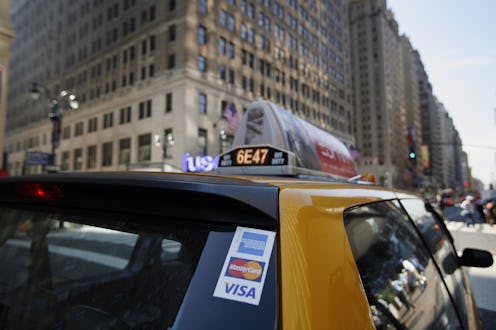News
Should Parents Be Allowed To Track Their Kids?
On Saturday, hundreds of mourners gathered for the funeral of New York teenager Avonte Oquendo. The 14-year-old Avonte, who was autistic, went missing from his school in Queens on Oct. 4. His body was discovered three months later in the East River. Avonte's disappearance sparked one of the largest missing-person campaigns in New York's recent history, and on Sunday, Sen. Charles Schumer (D-N.Y.) announced legislation in Avonte's name: "Avonte's Law." The proposed legislation would fund voluntary GPS tracking devices for autistic teens.
"If we had known within a matter of minutes where this boy was when he had walked out in a school, we might not be here," said David Perecman, an attorney for Oquendo's family, as Avonte's Law was announced. "Never again."
On Monday, Schumer will begin pushing the legislation through Congress, and has said that he expects bipartisan support for it. The plan would put aside $10 million to fund GPS tracking devices for autistic kids, and the sensor could be worn as a bracelet, sewn into clothing, or kept inside a wallet. If successful, Avonte's Law would be a program with the very best of intentions — but some potentially very problematic consequences. Equipping autistic children with a tracking device, even voluntarily (as Schumer's bill insists on) could open the gate for tracking devices for other groups of at-risk kids: suicidal teens; domestic violence victims; and children with developmental disorders.
As a society, if we green-light the GPS tracking of one at-risk group — and, if Avonte's Law passes through Congress, that's two — then we have to consider what other groups might benefit from being tracked, too. If we accept that some kids are safer being tracked, then we give their parents the responsibility of tracking them, and we usher in a new kind of surveillance: adults tracking where children go, what they do, and who they see. In short, unless we draw a clear line when it comes to tracking civilians, we run the risk of limiting the privacy of everybody.
Avonte's Law wouldn't be the first legislation to fund GPS tracking for at-risk groups. Actually, Schumer's bill would only extend a federal program in place already: the Missing Alzheimer's Disease Patient Assistance Program, which equips some Alzheimer's sufferers with GPS devices. It's estimated that nearly 60 percent of Alzheimer's sufferers will "wander" from their caregivers at some point, a statistic that's close to "wandering" figures for autistic kids. A recent report estimated that 49 percent of all autistic kids will wander away from their caretakers at some point, leading to a higher rate of drowning or death by injury than in non-autistic children.
Though no official cause of death has yet been established in the case of Avonte Oquendo, it's thought that the teen may have drowned in the East River. According to the National Autistic Association, nine in 10 wandering deaths in autistic kids come from drowning. "Thousands of families face the awful reality each and every day that their child with autism may run away," Schumer told press Sunday. "Making voluntary tracking devices available will help put parents at ease, and most importantly, help prevent future tragedies like Avonte’s."
Unfortunately, Avonte's Law doesn't take into account the social consequences of offering GPS tracking to at-risk groups. It sounds like common sense, but if we accept that it's OK to track those suffering from Alzheimer's or autism, what of small children who are prone to running away from their parents? What about kids diagnosed with ADHD, or those suspected to be suicidal, or the children that Protective Services suspects to be victims of abuse?
The case of Avonte Oquendo is unthinkably tragic. In five years, according to the Seattle Times, around 60 other autistic children have wandered from their caregivers and died. It's been suggested that the $10 million set aside from Avonte's Law might be better put to use educating school safety officers, who would in turn be better equipped to not let autistic students leave schools or other facilities. In Avonte's case, a school guard asked Avonte where he was going before he left the school premises. The guard didn't know Avonte was autistic and nonverbal, so when he didn't respond, the guard let him go.
Many people also criticize the mainstream schooling of special-needs pupils like Avonte, since school personnel often aren't adequately trained to deal with complex developmental disorders. That $10 million, say advocates, could be spent training school guards and teachers to know how to handle nonverbal and other developmentally-challenged kids.
As a society, if we green-light the GPS tracking of one at-risk group — and, if Avonte's Law passes through Congress, that's two — then we have to consider what other groups might benefit from being tracked, too. If we accept that some kids are safer being tracked, then we give their parents the responsibility of tracking them, and we usher in a new kind of surveillance: adults tracking where children go, what they do, and who they see. In short, unless we draw a clear line when it comes to tracking civilians, we run the risk of limiting the privacy of everybody.
Already, there's debate about tracking cell phones of missing persons, which doesn't require a warrant. Some workplaces have even introduced tracking sensors that monitor the productivity of their employees, and analyze how and when they produce their best work. (1984, anyone?) Plus, all cell phones are equipped with tracking devices, so if the federal government wants to find out exactly where you are, they can get that information from your cellphone company.
It's possible to track the movements and communication of every American citizen — and now that we know the NSA is doing pretty much exactly that, we need to lay some ground rules about who can and cannot be tracked.
